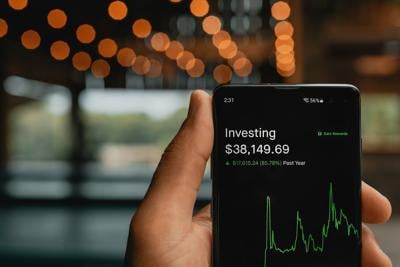
Via forex (foreign exchange) brokerage accounts, you can make wagers on global currencies by buying or selling currency pairings that respond to global economic changes. The forex market is open around-the-clock, starting in the United States on Sunday afternoon and closing on Friday afternoon after stock dealers have finished their day's work. As of 2023, currency markets transacted more than $6 trillion daily, surpassing global stock and bond markets in volume. Selecting the best type of forex broker to handle your currency transactions is a crucial factor to take into account when registering a retail forex trading account. This choice is vital since the sort of forex broker you select will impact your transaction costs, dealing spreads, and service quality.
What is a forex broker?
A forex broker is a business that offers financial services to traders and gives them access to a marketplace where they may buy and sell foreign currency. Foreign exchange is abbreviated as forex. Every transaction in the foreign exchange market involves a pair of two distinct currencies. A forex dealer may also be referred to as a retail dealer or a dealer in foreign exchange. The foreign exchange market is a global, round-the-clock market by necessity. According to the Exness review 2023, the best forex broker can help traders handle fees that may include commissions, access to professional advice, and withdrawal requests. They retain your money in an account that changes value every night in response to daily gains and losses. Retail currency traders who utilize these platforms to speculatively trade currencies are among a forex broker's clients. Large financial services companies that trade on behalf of investment banks and other businesses are also among their clients.
Types of Forex Brokers
There are three primary options for forex brokers to choose from when it comes to the important question of what their forex quotations are based on: no-dealing desk, market-making, and electronic communications network brokers. The following are common illustrations of the three various types of forex brokers.
No-Dealing Desk (NDD)
As the name suggests, the NDD type of forex broker does not have a dealing desk. The NDD broker's liquidity in the forex market is provided by the best composite quotes, which are acquired from a variety of forex quote providers. Each of these suppliers will often list the NDD forex broker's finest markets. The broker then completes deals, keeps an eye on the market, and fills customer orders accordingly. To generate a modest profit on each deal made, the NDD forex broker typically either levies a commission or widens the bid/offer spread, though they occasionally do both.
Market-making
A forex market maker often provides consumers with a two-sided market that originates from a professional forex trader who works as a member of the broker's own internal dealing desk. By buying on their bid side or selling on their offer side of the specified price, the broker will ultimately take the opposing side of any given transaction from their customer if the price is agreed on. The market maker's goal is to take a piece of the spread and execute enough trades on both sides of the market to prevent having to offload accumulated risk with a different experienced counterparty. Finally, the market maker may decide to offset the trade if it is substantial enough quickly.
Electronic Communications Network (ECN)
Typically, an Electronic Communications Network, or ECN, forex broker lacks a dealing desk. Instead, the broker offers an electronic trading platform through which traders, professional market-makers at banks, and other players in the forex market can enter offers and bids. Certain ECNs benefit from allowing the trader who posts the price to maintain some level of anonymity. This can be advantageous for traders who don't want to advertise their participation in the bid or offer.
How to choose the best forex broker?
Identifying your investing style and financial objectives is a need before selecting a forex broker. Every broker that offers forex investments has benefits and drawbacks. Regulation, the level of security offered by these organizations, and transaction fees are some of the most crucial factors to take into account. Every broker has a different set of security measures. To protect accounts from hackers, certain brokers offer built-in security mechanisms, including two-step authentication. There are many regulated forex brokers. The National Futures Association (NFA) and Commodities Futures Trading Commission (CFTC) of the United States, as well as Canada, the United Kingdom, France, Germany, Switzerland, and Austria, all regulate forex brokers.
However, not all brokers operate under regulation, so investors should be aware of unregulated companies. Moreover, platforms needed account minimums, and transaction costs varied among brokers. You might want to make a budget for your investment life before signing up for a trading platform. Choose your goals, your willingness to pay fees, and how much you would like to invest. While selecting the best platform for you, there are several different aspects to consider. Before participating, make carefully consider all relevant factors.
Here are Some Other Articles Related to Your Search:
What to Invest In During Recession: Stocks or Real Estate?
Strategy: Why The Dow Can Help Improve Your Investment Portfolio


(0) comments
We welcome your comments
Log In
Post a comment as Guest
Keep it Clean. Please avoid obscene, vulgar, lewd, racist or sexually-oriented language.
PLEASE TURN OFF YOUR CAPS LOCK.
Don't Threaten. Threats of harming another person will not be tolerated.
Be Truthful. Don't knowingly lie about anyone or anything.
Be Nice. No racism, sexism or any sort of -ism that is degrading to another person.
Be Proactive. Use the 'Report' link on each comment to let us know of abusive posts.
Share with Us. We'd love to hear eyewitness accounts, the history behind an article.